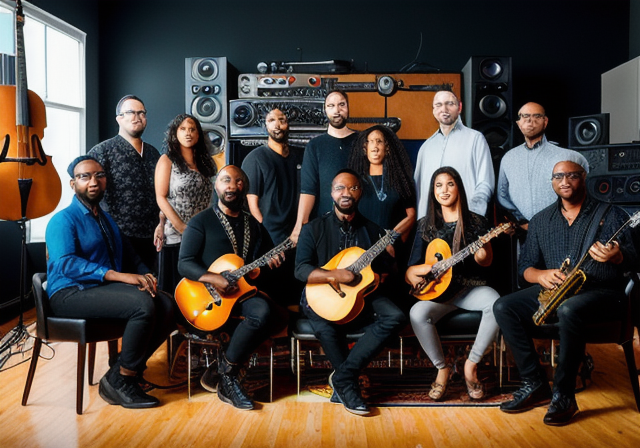Introduction
Music project management plays a crucial role in the music industry. It involves overseeing and coordinating various aspects of a music project, from recording and production to marketing and distribution. Effective project management ensures that all elements come together seamlessly, resulting in a successful music release. In this article, we will explore the importance of project management in the music industry and shed light on the critical role it plays in the success of music projects.
**One of the key reasons project management is essential in the music industry is the complex nature of music projects.** A typical music project involves multiple stakeholders, including artists, producers, songwriters, engineers, and marketing teams. These individuals or groups often work on different aspects of the project simultaneously, and **without proper project management, it can be challenging to keep everyone aligned and ensure that the project progresses smoothly**. Project management brings structure and organization to the process, **allowing for effective communication, coordination, and collaboration**.
**Another significant aspect of project management in the music industry is the management of resources, timelines, and budgets**. Music projects often have strict deadlines and limited budgets. **A skilled project manager is adept at resource allocation, scheduling, and budget management**, ensuring that the project stays on track and within the allocated resources. They work closely with the artists, producers, and other team members to set realistic goals and milestones, and **continuously monitor the progress to identify and address any potential issues or bottlenecks**.
**Furthermore, project management in the music industry involves understanding and navigating the ever-evolving landscape of music distribution and marketing**. With the rise of digital platforms and streaming services, the music industry has undergone significant changes in recent years. **A knowledgeable project manager keeps abreast of the latest industry trends and ensures that the project is positioned for success in the digital age**. They work closely with marketing teams to develop effective strategies for promoting the music project and reaching the target audience.

Key Responsibilities of a Music Project Manager
In the dynamic and creative world of music, project managers play a crucial role in ensuring the successful execution of various projects. They are responsible for overseeing the entire lifecycle of a music project, from conception to completion. Let’s delve into the key responsibilities that music project managers undertake:
Creating Project Plans and Timelines
One of the primary responsibilities of a music project manager is to create comprehensive project plans and timelines. This involves breaking down the project into manageable tasks, setting deadlines, and allocating resources effectively. By creating a well-defined roadmap, project managers provide clarity and direction to the entire team, ensuring that everyone is on the same page and working towards a common goal.
Coordinating with Artists, Producers, and Other Team Members
Effective coordination is key to the success of any music project. Music project managers act as the central point of contact, facilitating communication and collaboration between artists, producers, engineers, session musicians, and other team members. They ensure that everyone is aligned with the project’s vision and objectives, fostering a harmonious working environment.
Managing Budgets and Resources
Managing budgets and resources is an essential aspect of music project management. Project managers are responsible for overseeing financial aspects, such as budget allocation, cost estimation, and expense tracking. They work closely with finance teams to ensure that projects stay within budget. Additionally, they allocate resources effectively, ensuring that equipment, studio space, and personnel are available when needed.
Ensuring Smooth Communication and Collaboration
Clear and effective communication is vital in the music industry, where multiple stakeholders collaborate on complex projects. Music project managers facilitate seamless communication by establishing effective communication channels, conducting regular meetings, and providing timely updates to all involved parties. By fostering open lines of communication, project managers ensure that information flows smoothly and that any issues or roadblocks are addressed promptly.
Monitoring and Tracking Project Progress
Monitoring and tracking project progress is essential to keep projects on track and identify potential bottlenecks. Music project managers use various tools and techniques to monitor the progress of tasks, milestones, and deliverables. This allows them to identify any deviations from the plan and take corrective actions to ensure that projects stay on schedule. Regular progress reports and status updates keep all stakeholders informed about the project’s overall health and progress.
Handling Unforeseen Challenges and Issues
Music projects can be unpredictable, and project managers need to be adept at handling unforeseen challenges and issues. Whether it’s last-minute changes to the production schedule, technical difficulties during recording sessions, or unexpected budget constraints, project managers must think on their feet and find creative solutions. Their ability to adapt and navigate through these challenges is crucial in ensuring the successful completion of music projects.
Music project managers play a pivotal role in the music industry, bringing together the creative and logistical aspects of music production. By meticulously planning, coordinating, and managing resources, they enable artists and teams to create exceptional music that resonates with audiences worldwide.
Skills and Qualifications of a Music Project Manager
A successful music project manager possesses a diverse range of skills and qualifications that enable them to effectively oversee and coordinate the various aspects of a music project. Let’s delve into some of the key skills and qualifications that make a music project manager invaluable:
Strong Organizational and Time Management Skills
**Organizational and time management skills** are paramount for a music project manager. They are responsible for creating project plans, setting timelines, and ensuring that tasks are completed efficiently. With numerous moving parts in a music project, the ability to prioritize tasks, manage resources, and meet deadlines is crucial.
Excellent Communication and Interpersonal Skills
**Communication and interpersonal skills** are essential for establishing effective collaboration within a music project team. A music project manager must be able to clearly communicate project goals, expectations, and feedback to team members, artists, producers, and other stakeholders. Strong interpersonal skills also enable them to build rapport, resolve conflicts, and foster a positive working environment.
In-depth Knowledge of the Music Industry
**In-depth knowledge of the music industry** is a prerequisite for a music project manager. Understanding the nuances of the industry, including current trends, genres, and audience preferences, allows them to make informed decisions and guide the project in the right direction. This knowledge also helps them navigate the complexities of licensing, copyrights, and contracts.
Proficiency in Project Management Tools and Software
**Proficiency in project management tools and software** is vital for ensuring streamlined project execution. Music project managers leverage various tools to plan, track progress, allocate resources, and manage budgets. Familiarity with software like Asana, Trello, or Jira, as well as music-specific software like Pro Tools or Ableton Live, enables them to optimize project workflows and enhance productivity.
Ability to Adapt to Changing Circumstances
The ability to **adapt to changing circumstances** is a hallmark of a skilled music project manager. The music industry is dynamic and constantly evolving, presenting unexpected challenges and opportunities. A project manager must be flexible and agile, adept at adjusting plans and strategies as needed. Their adaptability ensures that the project stays on track, even in the face of unforeseen circumstances.
Leadership and Team Management Skills
**Leadership and team management skills** are crucial for guiding a music project to success. A project manager must inspire and motivate team members, fostering a collaborative and productive environment. Effective leadership involves delegating tasks, providing guidance, and nurturing talent. By leveraging their leadership skills, project managers can bring out the best in their team, resulting in exceptional project outcomes.

Challenges Faced by Music Project Managers
Being a music project manager comes with its fair share of challenges. From tight deadlines and managing diverse personalities to handling unexpected technical issues, there are various obstacles that these professionals must navigate. Let’s take a closer look at some of the key challenges faced by music project managers:
Tight Deadlines and Time Constraints
Tight deadlines are a common challenge faced by music project managers. Whether it’s coordinating the release of an album or organizing a live concert, there are often strict timelines that must be adhered to. Music project managers need to carefully plan and allocate resources to ensure that all tasks are completed on time.
Time constraints can be particularly challenging in the music industry, where creativity and inspiration are not always bound by a 9-to-5 schedule. Artists and musicians may have different working styles and prefer to work at unconventional hours. It is the project manager’s responsibility to find a balance between respecting the creative process and meeting deadlines.
Managing Diverse Personalities and Egos
Working with artists, musicians, producers, and other stakeholders in the music industry means dealing with diverse personalities and egos. Each individual involved in a project may have their own unique vision and creative input, which can sometimes lead to conflicts and disagreements.
A music project manager must possess excellent communication and interpersonal skills to mediate and resolve conflicts. They need to foster a collaborative and respectful environment where everyone’s ideas are valued, while still keeping the project on track.
Dealing with Creative Differences
Creative differences can arise when multiple artists or musicians collaborate on a project. Each individual brings their own style, preferences, and artistic vision, which may not always align. The challenge for a music project manager is to find a way to harmonize these different creative voices and create a cohesive final product.
This requires a delicate balance between facilitating open communication and compromise. The project manager needs to understand the artistic goals of each individual and find common ground where their visions can merge.
Handling Unexpected Technical Issues
The music industry heavily relies on technology, and unexpected technical issues can throw a project off course. From equipment malfunctions during a live performance to software glitches in the studio, these issues can disrupt timelines and create stress for everyone involved.
A music project manager needs to be prepared to handle such situations by having contingency plans in place and maintaining strong relationships with technical experts. They must be resourceful and find quick solutions to minimize the impact of technical difficulties on the project.
Balancing Artistic Vision and Commercial Viability
One of the ongoing challenges for music project managers is finding the right balance between artistic vision and commercial viability. The music industry is a business, and projects need to generate revenue to be sustainable. However, sacrificing artistic integrity for commercial success can be a delicate decision.
The project manager needs to work closely with artists, record labels, and other stakeholders to strike a balance that satisfies both the creative aspirations of the project and its commercial objectives. This requires a deep understanding of the music industry, market trends, and audience preferences.
Managing music projects is a complex endeavor that requires a unique set of skills and qualities. From navigating tight deadlines and managing diverse personalities to handling unexpected technical issues and balancing artistic vision with commercial viability, music project managers play a crucial role in bringing musical projects to life.
Tips for Successful Music Project Management
Managing a music project requires careful planning, effective communication, and a keen eye for detail. By following these tips, you can ensure that your project stays on track and achieves its goals.
Clearly Define Project Goals and Objectives
Before embarking on any music project, it’s essential to clearly define the goals and objectives. This includes determining the desired outcome, target audience, and any specific milestones or deadlines. By having a clear vision of what you want to achieve, you can guide the project in the right direction and make informed decisions along the way. **Setting clear goals also helps to keep everyone on the same page and focused on the common objective**.
Establish Effective Communication Channels
Communication is key in any project management role, and music projects are no exception. **Establishing effective communication channels ensures that everyone involved is informed and can collaborate efficiently**. Regular team meetings, email updates, and project management tools can all contribute to seamless communication. It’s also important to create an environment where team members feel comfortable sharing their ideas and concerns. **Encouraging open and transparent communication fosters a positive and productive working atmosphere**.
Break Down the Project into Manageable Tasks
Music projects can be complex, involving various elements such as songwriting, recording, production, and promotion. Breaking down the project into smaller, manageable tasks helps prevent overwhelm and allows for better planning and resource allocation. **Creating a clear project timeline with specific milestones and deadlines for each task ensures that progress can be tracked effectively**. Use project management software or tools to keep track of tasks, deadlines, and dependencies.
Delegate Responsibilities to Team Members
As a music project manager, it’s crucial to delegate responsibilities to team members based on their strengths and expertise. **Assigning tasks to the right people ensures that each aspect of the project is handled with skill and efficiency**. Delegation also empowers team members and encourages their professional growth. Regularly assess the workload and make adjustments as necessary to maintain a balanced distribution of tasks.
Regularly Monitor and Evaluate Project Progress
Monitoring and evaluating project progress is essential to identify any potential issues or bottlenecks. **Regular check-ins and progress reports help keep the project on track and allow for timely adjustments if needed**. Use project management tools to track milestones, deadlines, and overall progress. Regularly review the project’s performance against the defined goals and objectives and make adjustments as necessary.
Be Open to Feedback and Adapt as Needed
In the dynamic world of music, things can change quickly. **Being open to feedback and adapting to new circumstances is crucial for successful project management**. Encourage team members to provide input and ideas, and be willing to make adjustments based on their feedback. Embrace a flexible mindset and be prepared to make changes to the project plan when necessary.
By following these tips, music project managers can effectively navigate the challenges and complexities of their role. Clear goal-setting, effective communication, task delegation, regular monitoring, and adaptability are key ingredients for successful music project management.




